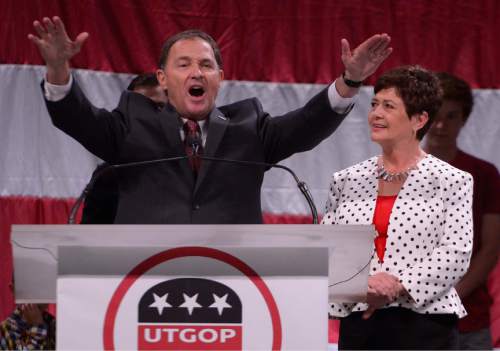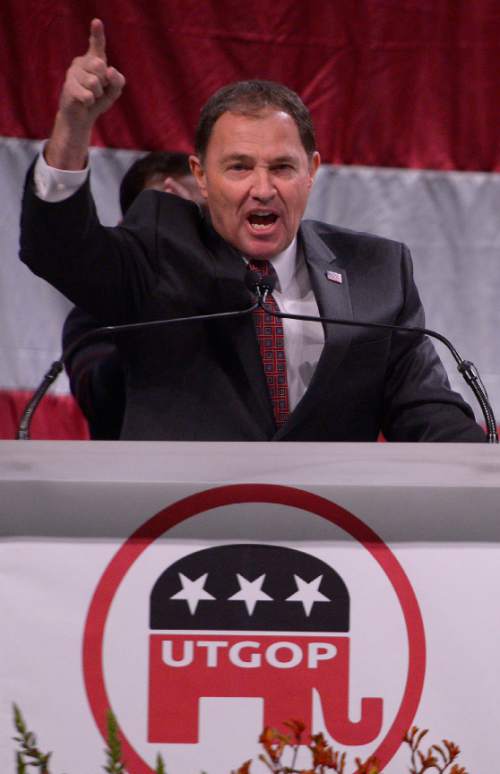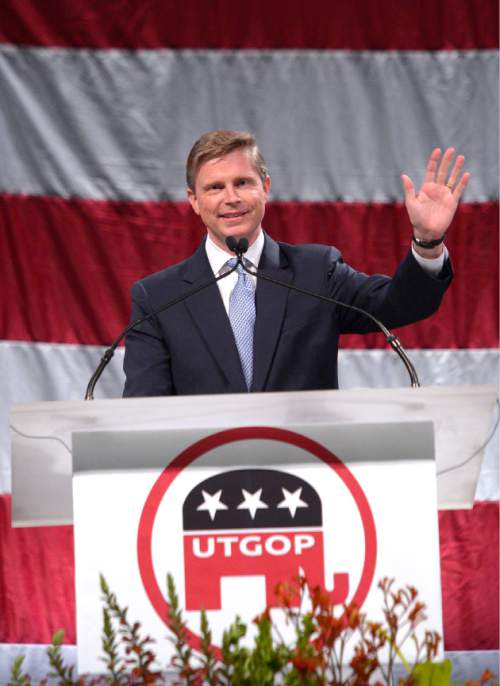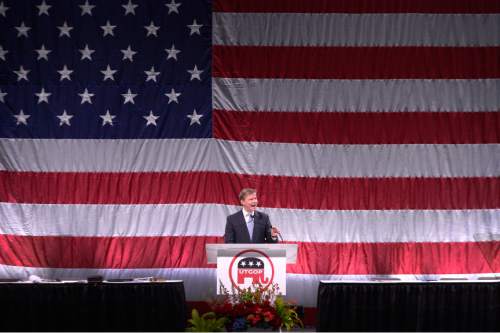This is an archived article that was published on sltrib.com in 2016, and information in the article may be outdated. It is provided only for personal research purposes and may not be reprinted.
The fundraising focus in the battle for the Republican governor's nomination isn't letting up as Overstock CEO Patrick Byrne continues to pour money into challenger Jonathan Johnson's campaign, prompting Gov. Gary Herbert's team to ask: What does Byrne expect for his generosity?
Byrne, in recent days, wrote a check for $250,000 to Johnson's campaign, bringing his total contributions to the cause to $600,000, which is likely the largest single donation to a political candidate in Utah and makes up more than half what Johnson has raised.
Last week, even before the latest donation, Herbert referred to Byrne as Johnson's "sugar daddy" because of the money he has pumped into the challenger's bid to unseat the governor in their June 28 primary.
"It's unprecedented, and there's reason for all Utahns to question what type of influence does that kind of donation buy in a potential Johnson administration," said Herbert campaign manager Marty Carpenter.
Johnson, Overstock's chairman of the board, says he doesn't owe his longtime business partner a thing.
"I am not beholden to Patrick Byrne," Johnson said in a recent interview. There are issues on which the two agree, Johnson said, and others in which they part ways. Besides, there would be heightened scrutiny of his relationship with Byrne because of their history and because Byrne has given so much to the campaign.
For his part, Byrne said he has given money to numerous "pro-freedom" causes across the country and believes Johnson would be a good governor.
"Even though on several issues I do differ with Jonathan Johnson … we are aligned on views on freedom within a constitutional structure of limited government, so it is only natural I would support him without expecting anything in return," Byrne said in a statement. "I have seen firsthand what an intelligent, dedicated leader Jonathan is, and know that he would be good for the people and business of Utah."
The latest exchange came after Johnson hammered Herbert for comments made during a fundraising meeting last month with a group of well-connected lobbyists and supporters. In that gathering, Herbert said he was available to huddle one on one with the lobbyists' clients to discuss issues and collect checks for the campaign.
Johnson called the governor's comments "sickening" and said it represented a pay-to-play mentality that is the problem with career politicians trying to remain in office.
Carpenter fired back at Johnson over the latest Byrne donation.
"To go within the time frame of one week from wagging your finger at the fundraising practices of the other candidate to cashing a quarter-million-dollar check from someone who has essentially funded your entire campaign seems to be beyond hypocritical and certainly worthy of Utah voters asking questions," Carpenter said.
Byrne's donation appears to be the largest single contribution to a candidate in Utah's political history, although records are not easily searchable.
Others have given more to, say, ballot initiatives — including Byrne and his family who spent millions on a school-voucher effort. Several candidates have spent more self-funding their races, including Democratic gubernatorial candidate Mike Weinholtz, who has loaned his campaign $1 million this year.
Byrne gave $200,000 to Johnson's Promote Liberty political-action committee before shifting the donations to the campaign this year and kicking in another $400,000.
In addition to Byrne's contributions, Johnson and his wife, Courtney, have spent $191,000 of their own money on the race, and political consultant Chuck Warren has given about $200,000 personally and through his companies — $179,800 of that as an "in-kind" gift of voter and consumer data.
"[Johnson] is one of my dearest friends and [the data] is something I have that's of value," said Warren, who has known Johnson for 13 years. "They use it for targeting, they use it for modeling, they use it to create profiles of the type of voters that would be inclined to vote for Jonathan. … and it's useful to a guy who is chairman of a billion-dollar-plus e-commerce company."
Taken together, Byrne, the Johnsons and Warren make up more than 85 percent of all the money Johnson has raised for his campaign.
But big donations typically don't drive where a candidate stands on the issues, according to Jay Goodliffe, a political science professor at Brigham Young University who studies campaign-finance issues.
"What some people worry about with big donors is they're somehow buying the policy that's going to be enacted once the governor or president get into office. And that can be the perception, and that can be a damaging perception," he said. "But, in general, donations — whether they're large donors or small donors — they generally go to people that already agree with them."
Byrne is no stranger to headlines over his controversial views on business and his libertarian stance on political issues.
In 2007, Byrne and his family gave about $4 million to oppose a ballot initiative seeking to repeal a statewide school-voucher program passed by the Legislature.
Voucher supporters suffered a crushing defeat. Byrne called it a "statewide IQ test" that Utah failed.
Johnson and his family appeared in television ads for the pro-voucher side, and his lieutenant governor candidate, Robyn Bagley, said she still backs vouchers. But Johnson said voters have spoken, although he believes "educational savings accounts," like those enacted in Arizona, are a good idea.
Byrne is one of a handful of wealthy business executives who have pledged to help fund a ballot initiative to legalize medical marijuana in Utah, a cause Johnson said he supports.
Overstock and Byrne also have opposed proposals, like one in Utah, to require online retailers to collect and remit sales tax on their products. Herbert is a vocal supporter of the idea, saying the state is losing as much as $180 million a year because of unpaid Internet sales tax. Johnson said recently he wants Congress to fix the issue. Overstock pays sales tax on purchases by Utahns.
Byrne was also a major donor in the fight to overturn Utah's constitutional amendment banning same-sex marriage, and Overstock has been a sponsor of Salt Lake City's Gay Pride Parade.
Johnson said he and Byrne differ on that issue. It bothered him that Overstock was "so front and center" on the parade, and the candidate believes marriage should be between a man and a woman. He does believe couples should have "contractual rights," and he supports Overstock extending benefits to domestic partners.
Johnson formed a PAC in 2013 to defend Utah's now-defunct marriage ban, prompting calls for his firing, but he said the marriage issue is settled.
"I'm not going to try to pick that scab, unsettle the issue," he said. "I do think we need to protect religious liberties, and I don't want churches to be forced to perform marriages that are against a church's stated tenets."
Byrne has also had clashes in the business world, leading a vocal crusade against "naked short selling" of stocks that has put him at odds with many on Wall Street. He was recently ordered by a Canadian court to pay $1.1 million in libel damages to a businessman for helping to publish a website that suggested the competitor had terrorist ties.
Twitter: @RobertGehrke









